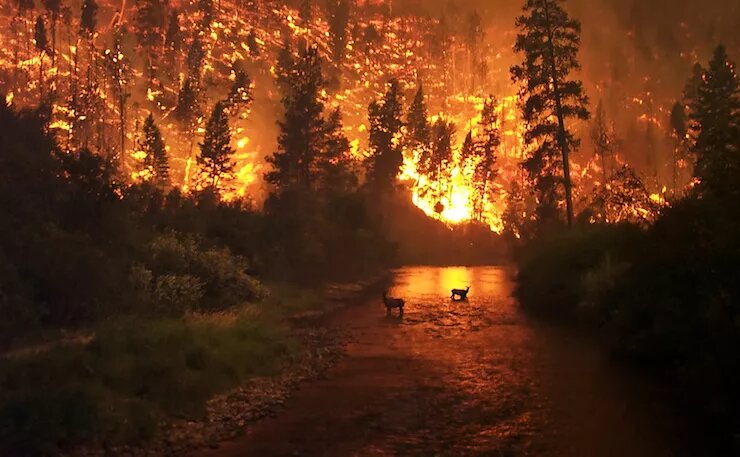
The year 2020 is coming to an end. I recently read that it was an annus horribilis, a terrible year. There are good reasons for that. In 1992, the year of her 40th anniversary on the throne, Queen Elizabeth II spoke of an annus horribilis, because her family had been the subject of numerous scandals in that year. A hundred years earlier, the Anglican Church called 1870 an annus horribilis because at that time, the Roman Catholics had invented the dogma of Papal infallibility.
Well, one could say that 2020 was even more filled with horrors. The Corona pandemic alone is enough to speak of a particularly bad year. Add to that the rapidly worsening climate crisis, which again brought new extreme weather records: four of the five of the largest wildfires ever in California, with smoke reaching as far as the U.S. East Coast; a new record number of storms in the Atlantic hurricane season; countless deadly floods. This was also the year in which the People's Republic of China, with the stroke of a pen from Beijing, took away all the freedoms previously guaranteed for 50 years from the seven million citizens of Hong Kong, creating a signal for the spread of authoritarian rule.
The year in which henchmen of the Russian autocracy poisoned their country's leading opposition politician for the whole world to see, and as a form of deterrence, only to claim afterwards that either the Americans or the Germans were to blame. It is the year in which the 45th American president went completely mad and subjected his country's venerable democracy to a more dangerous test of disruption than any since the American Civil War over 150 years ago. The year in which Orbán and Kaczyński chose to blackmail the entire EU in order to avoid following rule-of-law principles, while at the same time the poison of nationalist self-importance spread elsewhere in the European Union. The year in which damnable Brexit was pushed through. The year in which Sultan Erdogan I dangerously stepped up his neo-Ottoman provocations. Shall I go on?
I want to stop with this monotony of horrors. Despite all the negative and deplorable things we can all list, there were also important progressive breakthroughs this year. Some imminent disasters were averted and conditions were created to more effectively lead the struggle for a better future.
There were two important changes in the EU. First, there was a strategically infinitely valuable decision, indispensable for the common perspective of the EU, to organize a response to the major upheavals in the wake of the current pandemic on the basis of solidarity between member states. I believe that without this thoroughly courageous decision, the EU would probably have had no future. The frightening disintegration into nationally self-motivated actors without a sense of common purpose which was evident in the first months of the pandemic threatened to rob the entire European unification project of its plausibility. After all, why bother with an integration project if you are left alone in the hour of greatest need? That's when the EU got its act together.
The second major breakthrough is that the Green Deal became the guiding principle of common policy development at the EU level. When it comes to details, there is an enormous amount to criticize. The ambition is not big enough. Agriculture is left out. We do not yet know how this could work with a CO2-related border adjustment mechanism to protect the European industry relying on green innovation against ecologically harmful external dirty competition… and so on and so forth. But the headline is right. The direction is indicated. Those who hesitate must justify it, and not just those who want to push ahead. This new framework makes it easier for climate movements, whether they take place on the streets or in a Chamber of Commerce plenary session, to gain space and assertiveness. Incidentally, there is a third factor to add to my fundamental European optimism: the success of populists and right-wing radicals has its limits.
The second important breakthrough is that democratic forces in the U.S., including a number of Republicans, have succeeded in fending off Donald Trump's populist-authoritarian attack on fundamental values. Trump was defeated, even if Trumpism lives on. It is a huge encouragement that in 2021 it is still possible to hope for what Abraham Lincoln formulated in his famous Gettysburg Address in 1863. There is a rebirth of freedom. And the „government of the people, by the people, for the people shall not perish from the Earth“.
The challenges may be greater than the victories, the dangers more numerous than the moments of success. But it seems to me that in all the crises and catastrophes the insight is starting to emerge that a new beginning is necessary, indeed inevitable, because the status quo is both unbearable and untenable. It is not only populism that teaches us that defending the status quo offers no perspective. The Fridays for Future youth movement, too, with its uncompromising stance, which so readily puts forward an almost theological transfiguration of science, opposes - and rightly so! - any attitude that does not accept fundamental change as a necessity. In the face of climate change, which, if it continues unhindered, threatens to destroy all human civilization as we know it, and in the face of a worldwide authoritarian wave, ecological responsibility and the will to freedom are the two main motives that must guide the great transformation to come.
The year 2020 has been a difficult one. But perhaps in retrospect we will be able to say that for this very reason, it was a year in which the determination to initiate change grew and the forces were gathered for a fundamental Building Back Better.